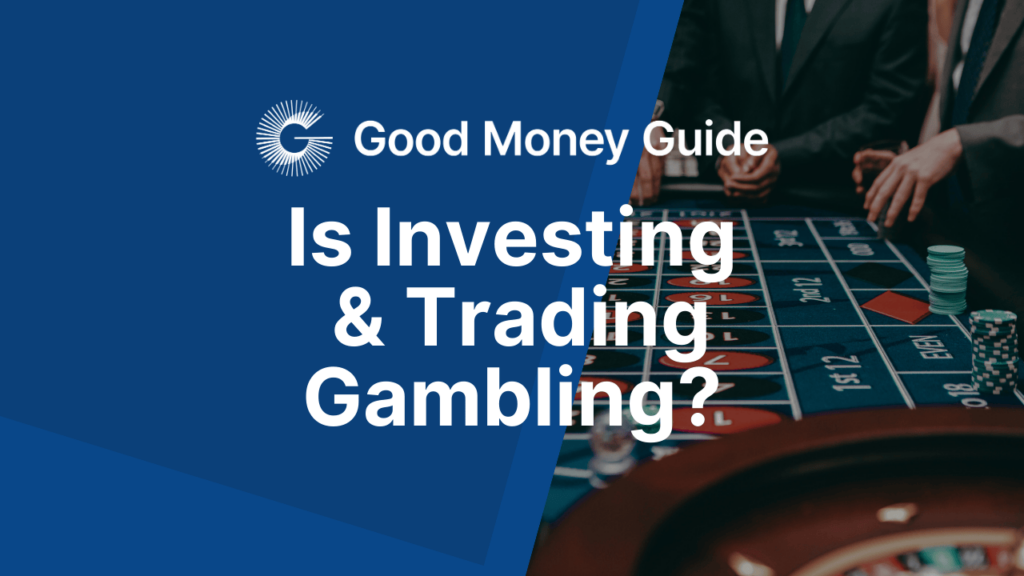Yes, it is. If you are buying stocks, funds, ETFs or pay into your pension you are taking a risk that it will go up more than it goes down. So you are taking an educated bet that the markets will make you money. However, there are different levels of risk-taking. Investing in bonds, is less of a gamble than stocks, as you receive income as opposed to capital growth. But that’s just a sliding scale.
All investing carried risk and there is still a chance that your investment will go to zero. You will see this risk warning on every single financial promotion.
That may sound facisious, but it’s a matter of opinion.
However, there is a form of investing and trading that is definitely gambling, and that’s financial spread betting. When you spread bet on the financial markets you are betting an amount per point that a share price will move up or down. It’s been around in the UK since 1974 when it was pioneered by IG who allowed their customers to bet on the price of gold (instead of trading gold futures).
What’s great about using a spread betting broker for trading is that as trades are structured as bets, all of your profits are tax free. But beware, trading is a tough game and most people who try it lose money. Just read our risk warning statistics to see how many!
But, there is a way to gamble, by not gambling, whilst making money, but still getting the thrill of potentially losing money. But significantly reducing the risk of doing so.
Don’t gamble, invest!
It’s not exactly ESG investing. But, if you’d bought shares in gambling companies rather than chips, slips or spin you could have been rolling in winnings.
I love a bit of horseracing, I’m partial to sports spread betting on it, because it’s more like trading the financial markets than outright betting. I love the thrill of the race, like most do. The result is almost secondary. When I win I usually regret not betting bigger and when I lose, I regret betting at all. The only fun part is the nearly winning.
But the house always wins. Sir James Goldsmith, once said to the legendary fund manager Jim Slater (an old client of mine and author of one of the greatest books on value investing The Zulu Principle):
If you want to gamble, own the casino.
You may not be able to afford an actual casino, but you certainly can invest in the companies that do.
To give you an example, let’s look at some of the biggest gambling stocks in the UK:
Biggest publicly listed gambling stocks in the UK
If you are going to invest in gambling stocks, here are some of the gambling company stocks that you could invest in:
IG
IG Group Holdings PLC provides online trading services to its clients. The majority of the company’s revenue stems from its derivative products and contracts for difference (CFDs). The company operates through various segments which are The U.K. segment which derives its revenue from financial spread bets, CFDs, binary options, and execution-only stockbroking. The Australian segment derives its revenue from CFDs and binary options. The European segment derives its revenue from CFDs, binary options, and execution-only stockbroking. The Rest of the World segment derives its revenue from the operation of a regulated futures and options exchange as well as CFDs and binary options. The company generates more than half of its revenue from the U.K., followed by Europe and Australia.
CMC Markets
CMC Markets PLC is a United Kingdom-based company that provides online and mobile trading services. The company’s core business is to provide online retail financial services and allows people to trade in various financial products of underlying assets such as forex markets, indices, shares, commodities, and treasuries. Its operating segments include CFD (contracts for difference) and Spreadbet in UK and Ireland, Europe, Australia, New Zealand, and Singapore and Canada, and Stockbroking in Australia. The company generates maximum revenue from the CFD segment.
Plus500
Plus500 Ltd is an online provider of Contracts for Difference (CFDs). Plus500 has developed and operates an online trading platform for retail customers to trade CFDs internationally over more than 2,200 different underlying global financial instruments comprising equities, indices, commodities, options, exchange-traded funds (ETFs), and foreign exchange. The company enables retail customers to trade CFDs in more than 50 countries and over 31 languages. The trading platform is accessible from multiple operating systems including Windows, smartphones: iOS, Android, and Windows Phone, tablets: iOS, Android, and Surface, and web browsers. The group is engaged in three operating sectors: CFD trading; share dealing; and futures and options on futures.
Flutter
Flutter is a global sports betting, gaming and entertainment provider for over 18 million customers worldwide and the parent company of leading global consumer brands such as FanDuel, Sky Betting & Gaming, Paddy Power, PokerStars, Betfair and Sportsbet.
Etain
Entain PLC is an online sports betting and gaming company. It owns a portfolio of sports brands that include bwin, Coral, Crystalbet, Eurobet, Ladbrokes, Neds and Sportingbet; Games Brands include CasinoClub, Foxy Bingo, Gala, Gioco Digitale, partypoker and PartyCasino. The Group’s operating segments are aggregated into five reportable segments: Online, Retail, New Opportunities, Other and Corporate.
Playtech
Playtech PLC specializes in gambling software for various online gambling networks that include online casinos, online bingo, mobile gaming, and online sports betting. The company’s open platform software allows customers to build and market casino games that include blackjack, baccarat, slots, and roulette. The company’s business segments are gaming B2B and gaming B2C. Gaming B2B is the division that operates casinos, services, sport, bingo, poker, and other B2B gambling. The segment gaming B2C controls Snaitech, Sun Bingo, and other B2C gambling. The company is based on the Isle of Man and generates the majority of revenue from the Italy and United Kingdom.
You can still lose money investing!
It’s also important to note that you can still lose money investing. Some of the greatest investors in the world lose money at some point. But, the key to successful investing is being in it for the long haul. No-one makes money overnight. There are no get-rich-quick shortcuts. If you want to make money investing, buy shares and do nothing.
One thing to note though is that (and you will see this on all investment based websites): Past performance is not an indication of future performance.
This means that just because shares have gone up in the past, it doesn’t mean they will continue to go up in the future.
How to start investing in gambling stocks
To stop gambling and start investing the first thing you need is an investment account. There are many different types to choose from which you can read about in our investing section here. However, to buy individual shares you need a stockbroker.
The one we have used for this example is IG, one of the largest stockbrokers in the UK who charge £3 per trade for regular investing. There are loads of stockbrokers to choose from so take a look at our comparison tables to see which stockbroker suits you, sir.
Once you’ve taken your first step into a larger world. You’re no longer a gambler, you’re an investor.

Richard is the founder of the Good Money Guide (formerly Good Broker Guide), one of the original investment comparison sites established in 2015. With a career spanning two decades as a broker, he brings extensive expertise and knowledge to the financial landscape.
Having worked as a broker at Investors Intelligence and a multi-asset derivatives broker at MF Global (Man Financial), Richard has acquired substantial experience in the industry. His career began as a private client stockbroker at Walker Crips and Phillip Securities (now King and Shaxson), following internships on the NYMEX oil trading floor in New York and London IPE in 2001 and 2000.
Richard’s contributions and expertise have been recognized by respected publications such as The Sunday Times, BusinessInsider, Yahoo Finance, BusinessNews.org.uk, Master Investor, Wealth Briefing, iNews, and The FT, among many others.
Under Richard’s leadership, the Good Money Guide has evolved into a valuable destination for comprehensive information and expert guidance, specialising in trading, investment, and currency exchange. His commitment to delivering high-quality insights has solidified the Good Money Guide’s standing as a well-respected resource for both customers and industry colleagues.
You can contact Richard at richard@goodmoneyguide.com



